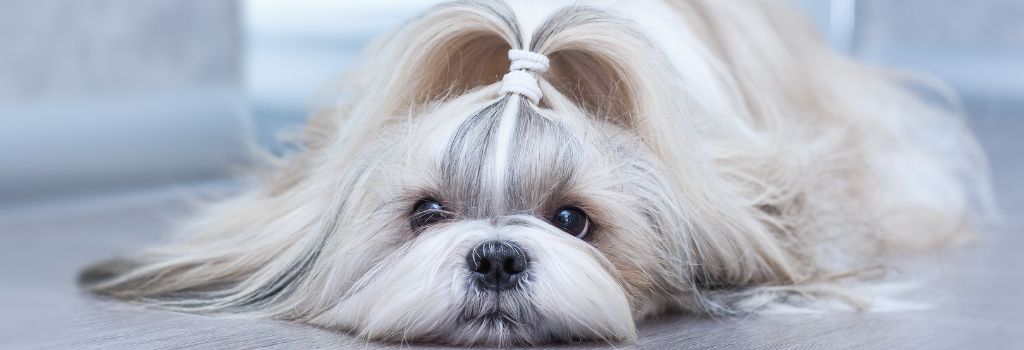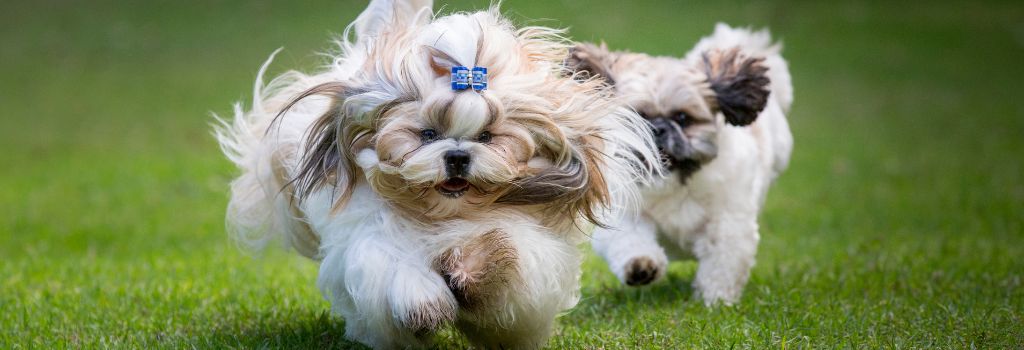If you've chosen a Shih Tzu as your furry friend, you've picked a breed with an irresistibly charming personality and a deep desire for companionship. Small in size but grand in demeanor, the Shih Tzu is truly a unique breed. Here's what makes this adorable lap dog such an exceptional companion.
Your Loving Companion
The Shih Tzu was born to be a companion dog and takes this job very seriously. These lovable pets are sweet, playful, and busy—always alert and curious about their surroundings. Their intelligence and friendliness make them easily won over and good around other pets and dogs.
Low Maintenance Exercise Needs
One of the best traits of the Shih Tzu is her minimal exercise requirements. She's more of an indoor dog who prefers short walks and playtime to long hours of strenuous activity. Ideal for families or individuals with a more laid-back lifestyle.
Small but Spirited
Don't let their petite size fool you; Shih Tzus are packed full of personality. Their unique traits, including an adorable underbite, make them one of the most popular breeds in the United States.

Challenges to Be Aware Of
However, every rose has its thorns. Your Shih Tzu may not fare well in hot climates and could bark more than you’d like. Proper socialization is crucial, as she can become snappy or fearful if not introduced to new experiences and people early on. Housetraining may require patience, and her small size makes her more susceptible to injury.
Craves Human Interaction
Shih Tzus thrive on attention from their family. They prefer to be where you are, making them perfect companions but also demanding of your time.
A Brief History
Known as the "Little Lion Dog," the Shih Tzu has a rich history dating back to 17th-century China. Thought to be a cross between the Tibetan Spaniel and the Lhasa Apso, this breed made its way to America in the 1960s, quickly rising in popularity and gaining AKC recognition in 1969.
Lifespan and Health
Generally speaking, Shih Tzus are a healthy breed with a lifespan ranging from 13-15 years. Their sensitivity to heat means they are best suited for moderate climates or indoor living with air conditioning.
If you're looking for a pet with a big personality packed into a small, lovable frame, a Shih Tzu might be your ideal companion. With their minimal exercise needs and love for human interaction, they make a superb choice for those seeking a devoted and low-maintenance friend.

Genetic Predispositions for Shih Tzu
Liver Problems in Your Shih Tzu: Know What's Up!
If your fluffy friend starts experiencing symptoms like stunted growth or even seizures, he might have a liver condition known as Portosystemic Shunt (PSS). In this disorder, blood that's supposed to flow through the liver takes a detour, leaving the liver a bit high and dry. The good news is that we've got some handy tests to catch this issue, such as a liver function test whenever your Shih Tzu needs anesthesia. Treatment might require surgery or possibly a special diet and medication. So keep an eye out!
Your Shih Tzu's Bone and Joint Health: A Complete Guide
You might notice that sometimes, your fur baby lifts a back leg while running and does a cute (but concerning) skip. This might be due to patellar luxation, a condition where the kneecap temporarily pops out of place. Mild cases often just need arthritis meds, while more serious ones may require surgery. And speaking of joints, ever heard of hip dysplasia? Early treatment is essential to manage arthritis that comes with it, so X-rays are your friend here. A little tip—keep your Shih Tzu's weight in check to reduce arthritis risk!
Spine 101: What You Need to Know for Your Shih Tzu
When it comes to the spine, IIntervertebral Disc Disease (IVDD) is a headline-stealer for Shih Tzus. If you notice your pup struggling with stairs, seeming hunched, or even experiencing paralysis, it's emergency time! Depending on severity, treatment could range from rest and medication to surgical intervention. And because prevention is better than cure, consider investing in pet-friendly ramps or steps to keep your buddy from jumping too much and straining his back.
Cloudy Eyes: Understanding Cataracts
As your Shih Tzu ages, you may notice a cloudiness in his eyes. While it can be alarming, many dogs adjust well to reduced vision. If it bothers you (or him), surgery to remove cataracts is an option. Just make sure you're discussing any changes in your pup's eyes during your regular vet visits.

Kidney Disease: Keep an Eye on that Pee!
If you own a Shih Tzu, you need to know about Glomerulonephropathy—an inherited disease that's a bit of a silent creeper. This condition gradually harms your pup’s kidneys, often manifesting at an early age. The good news is that a simple urine test can be an early warning system. Yearly urine analysis is recommended, as early detection often translates into a more affordable and efficient treatment plan. Special diets could even be part of the therapy package, so your furry friend can keep wagging that tail!
Stone Alert: It’s Not a Treasure Hunt
Shih Tzus are more susceptible to kidney and bladder stones than other breeds. While the idea of "stones" might sound like a playful treasure hunt, let me assure you—it's a painful adventure your buddy will want to skip. Signs like blood in the urine or straining to urinate are red flags. This isn’t a ‘wait-and-see’ situation; it’s a medical emergency. So, if you notice these symptoms, call your vet ASAP!
Cushing's Disease: More than Just a Cushy Belly
This condition is a slow-burner. Often going unnoticed in its early stages, Cushing's disease causes your Shih Tzu's adrenal glands to produce excessive steroid hormones. You might start seeing signs like increased thirst, more frequent urination, or a potbelly. A close relationship with your vet for medication adjustments can keep your doggo happier for longer. So if you see changes, don't chalk it up to your dog just "getting older"—consult your vet.
Cancer: Early Detection is a Game-Changer
As Shih Tzus generally live longer than other breeds, they're more prone to develop cancer in their golden years. A lump or bump during a regular check-up could be an early sign. Early detection is crucial, and treatments like surgery or chemotherapy have become increasingly effective. Your pup's senior years can still be golden if you stay vigilant.
All About Allergies: Scratch that Itch
If you see your Shih Tzu incessantly licking their paws, rubbing their face, or suffering frequent ear infections,allergies could be the culprit. Thankfully, we've come a long way in treating doggy allergies, and multiple options can bring relief to your itchy pet. And, speaking of ears, allergies can lead to ear infections which are not only uncomfortable but could cause long-term damage if untreated.
Bleeding Disorders: Know Before You Go (for Surgery)
If your Shih Tzu needs surgery, a blood test is critical to check for inherited bleeding disorders like Von Willebrand’s disease. Knowing beforehand can prevent severe bleeding during surgery and ensure that your pet comes out of any operation safely.

Matters of the Heart
Shih Tzus can develop various types of heart diseases at different life stages. Frequent vet physical exams that include listening for heart murmurs and abnormal rhythms are essential. Early diagnosis often allows treatment that can prolong your pet's life for many happy years to come.
The Short-Nose Struggle: Respiratory Distress Syndrome
Your Shih Tzu's adorable short nose could be a hidden danger, making them prone to Respiratory Distress Syndrome. Symptoms like exercise intolerance, loud breathing, or even bluish gums should be addressed immediately. In severe cases, surgical intervention might be the best option.
Dental Quirks: When a Smile Needs a Little Straightening
Lastly, let’s talk teeth! Shih Tzus are more likely to have dental issues, like overbites or underbites. Misaligned teeth can be more than a cosmetic issue; they can lead to real health problems. But, hey, dog braces are a thing, and they can correct those issues!
If you have questions and you'd like to reach out to us, you can call us directly at (859) 625-5678, or you can email us at [email protected]. Don't forget to follow us on social media Facebook, Instagram.
